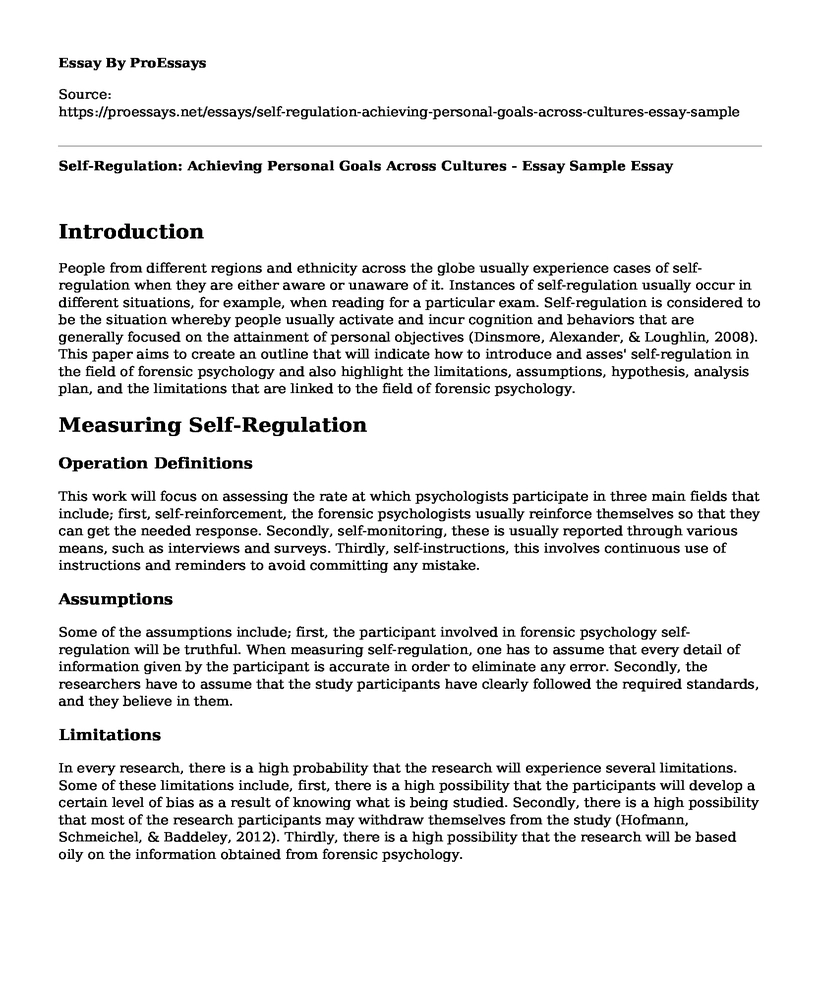Introduction
People from different regions and ethnicity across the globe usually experience cases of self-regulation when they are either aware or unaware of it. Instances of self-regulation usually occur in different situations, for example, when reading for a particular exam. Self-regulation is considered to be the situation whereby people usually activate and incur cognition and behaviors that are generally focused on the attainment of personal objectives (Dinsmore, Alexander, & Loughlin, 2008). This paper aims to create an outline that will indicate how to introduce and asses' self-regulation in the field of forensic psychology and also highlight the limitations, assumptions, hypothesis, analysis plan, and the limitations that are linked to the field of forensic psychology.
Measuring Self-Regulation
Operation Definitions
This work will focus on assessing the rate at which psychologists participate in three main fields that include; first, self-reinforcement, the forensic psychologists usually reinforce themselves so that they can get the needed response. Secondly, self-monitoring, these is usually reported through various means, such as interviews and surveys. Thirdly, self-instructions, this involves continuous use of instructions and reminders to avoid committing any mistake.
Assumptions
Some of the assumptions include; first, the participant involved in forensic psychology self-regulation will be truthful. When measuring self-regulation, one has to assume that every detail of information given by the participant is accurate in order to eliminate any error. Secondly, the researchers have to assume that the study participants have clearly followed the required standards, and they believe in them.
Limitations
In every research, there is a high probability that the research will experience several limitations. Some of these limitations include, first, there is a high possibility that the participants will develop a certain level of bias as a result of knowing what is being studied. Secondly, there is a high possibility that most of the research participants may withdraw themselves from the study (Hofmann, Schmeichel, & Baddeley, 2012). Thirdly, there is a high possibility that the research will be based oily on the information obtained from forensic psychology.
Hypothesis
In most cases, people usually decide how to regulate their actions by specifically choosing which behavior or action to control. In this study, the hypothesis will indicate that the forensic psychologists who are to be congratulated due to their unique ethical actions as per the required standards are more likely to take part in various activities such as self-instruction, and self-monitoring.
Data Analysis Plans
To come up will the best results from the research, various measures will have to be implemented. Some of these measures include; first, the forensic psychologist will fill a research questionnaire using the test rate research approach to ensure the accuracy of the data. Secondly, to eliminate the possibility of any error, both the experiment and the control group will have to be crosschecked. Thirdly, every data obtained from the research will have to be scrutinized individually to ensure that it meets the right qualifications.
Critics That May Exist in the Limitations and Assumptions
Good research usually has various deficiencies and criticism on both the assumptions and limitations. In this s study, the deficiencies that are likely to be highlighted in the limitation is that letting the respondent know the kind of research they are involved in will be an encouragement rather than a limitation. While the deficiency in the assumption will be the respondent's feedback will be acquired in several loops, and the existing changes will be considered depending on the acquired response.
Conclusion
Self-regulation is usually essential in the human learning process. Self-regulation is usually composed of various components or factors, such as scrutinizing the actions and tactics in order to attain certain achievements. And having various ambitions that usually make one develop goal-oriented actions. With appropriate and effective hypothesis, the analysis of self-regulation in the field of psychology can be effectively achieved.
References
Dinsmore, D. L., Alexander, P. A., & Loughlin, S. M. (2008). Focusing the conceptual lens on metacognition, self-regulation, and self-regulated learning. Educational Psychology Review, 20(4), 391-409. https://link.springer.com/article/10.1007/s10648-008-9083-6
Hofmann, W., Schmeichel, B. J., & Baddeley, A. D. (2012). Executive functions and self-regulation. Trends in cognitive sciences, 16(3), 174-180. https://doi.org/10.1016/j.tics.2012.01.006
Cite this page
Self-Regulation: Achieving Personal Goals Across Cultures - Essay Sample. (2023, Mar 28). Retrieved from https://proessays.net/essays/self-regulation-achieving-personal-goals-across-cultures-essay-sample
If you are the original author of this essay and no longer wish to have it published on the ProEssays website, please click below to request its removal:
- Paranoid Schizophrenia Treatment Goals
- Essay Sample on Strategies of Meditation and Self-Reflection
- Research Paper on Organic Personality Disorder
- ADHD: Prevalence Doubles Over Past Decades - Essay Sample
- Essay Example on Child Abuse: Impacts on Mental Health
- Paper Example on Ben's Struggling PTSD: Seeking Support at the Youbeaut Clinic
- Case Study Sample on Jim Carrey: Leading Artist on Probation for Deteriorating Health







